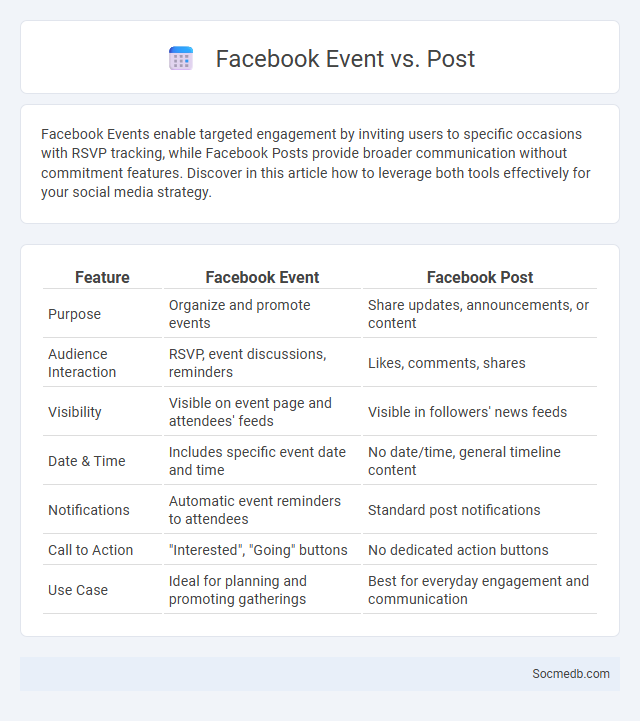
Photo illustration: Facebook Event vs Post
Facebook Events enable targeted engagement by inviting users to specific occasions with RSVP tracking, while Facebook Posts provide broader communication without commitment features. Discover in this article how to leverage both tools effectively for your social media strategy.
Table of Comparison
| Feature | Facebook Event | Facebook Post |
|---|---|---|
| Purpose | Organize and promote events | Share updates, announcements, or content |
| Audience Interaction | RSVP, event discussions, reminders | Likes, comments, shares |
| Visibility | Visible on event page and attendees' feeds | Visible in followers' news feeds |
| Date & Time | Includes specific event date and time | No date/time, general timeline content |
| Notifications | Automatic event reminders to attendees | Standard post notifications |
| Call to Action | "Interested", "Going" buttons | No dedicated action buttons |
| Use Case | Ideal for planning and promoting gatherings | Best for everyday engagement and communication |
Understanding Facebook Events, Posts, and Pages
Facebook Events enable users to organize, promote, and manage gatherings with features like RSVP tracking and event reminders. Posts on Facebook allow individuals and businesses to share updates, photos, and videos that engage followers through likes, comments, and shares. Facebook Pages serve as dedicated spaces for brands, public figures, and organizations to build a community, provide information, and interact with their audience effectively.
Key Differences: Facebook Event vs Post
Facebook Events enable users to create dedicated invitations with date, time, and location details, facilitating organized attendance tracking and reminders for upcoming activities. Facebook Posts serve as general content updates, allowing multimedia sharing and engagement without structured event information or RSVP options. The Event feature is tailored for planning and promotion of specific occasions, whereas Posts provide broad communication suited for announcements, interactions, and real-time updates.
Purpose of a Facebook Event
A Facebook Event serves to organize and promote gatherings, enabling hosts to invite and inform attendees easily. It provides a centralized platform for sharing event details, updates, and engaging potential participants through comments and notifications. This feature enhances community building and event visibility by leveraging Facebook's extensive user network.
When to Use a Facebook Post
Facebook posts are most effective when sharing timely updates, engaging visual content, or important announcements to reach a broad audience quickly. Utilize Facebook's algorithm by posting during peak user activity times, typically early afternoons from Wednesday to Friday, to maximize visibility and interaction. Tailoring posts with clear calls-to-action and relevant hashtags can significantly boost engagement and drive traffic to your content.
Comparing Audience Reach: Event vs Post
Event posts on social media typically generate higher audience reach due to built-in notifications and calendar integration, driving more engagement and attendance. Regular posts rely primarily on algorithmic visibility and timing, often resulting in limited organic reach without paid promotion. Understanding these differences helps you strategically choose formats to maximize your campaign's impact and target audience engagement.
Engagement Metrics: Events versus Posts
Engagement metrics on social media reveal distinct impacts when comparing events versus posts; events typically generate higher user interaction due to their time-sensitive nature and call-to-action features. Your social media strategy should leverage event analytics such as RSVPs, comments, and shares to gauge audience involvement more effectively than post likes or reactions alone. Understanding these metrics helps optimize content scheduling and boosts community engagement by focusing on dynamic, participatory experiences.
Promotion Strategies for Events and Posts
Effective promotion strategies for events and posts on social media leverage targeted advertising and influencer partnerships to maximize reach and engagement. Utilizing platform-specific features such as Instagram Stories, Facebook Events, and LinkedIn Sponsored Content enhances visibility and drives audience interaction. Consistent use of relevant hashtags, compelling visuals, and timely posting further boosts organic growth and event attendance.
Best Practices for Facebook Event Creation
Creating Facebook events with clear, concise titles and detailed descriptions improves visibility and engagement. Utilizing high-quality images, setting accurate dates and locations, and including relevant keywords boosts event discoverability through Facebook's search algorithms. Encouraging interactions by adding co-hosts, posting updates, and responding to comments enhances community participation and event success.
Optimizing Facebook Posts for Visibility
Optimizing Facebook posts for visibility involves using relevant keywords, engaging visuals, and concise, clear language that resonates with your audience. You should schedule posts during peak engagement times based on your target demographic's online activity patterns. Incorporating interactive elements like polls or questions can boost engagement, increasing the likelihood that Facebook's algorithm prioritizes your content in users' news feeds.
Choosing the Right Tool: Event, Post, or Both?
Choosing the right social media tool depends on your marketing goals and audience engagement strategy. Event posts are ideal for promoting time-sensitive activities, driving real-time interaction, and boosting attendance, while regular posts sustain ongoing brand awareness and community connection. Your decision should balance event-specific momentum with consistent content to maximize reach and impact across platforms.
 socmedb.com
socmedb.com